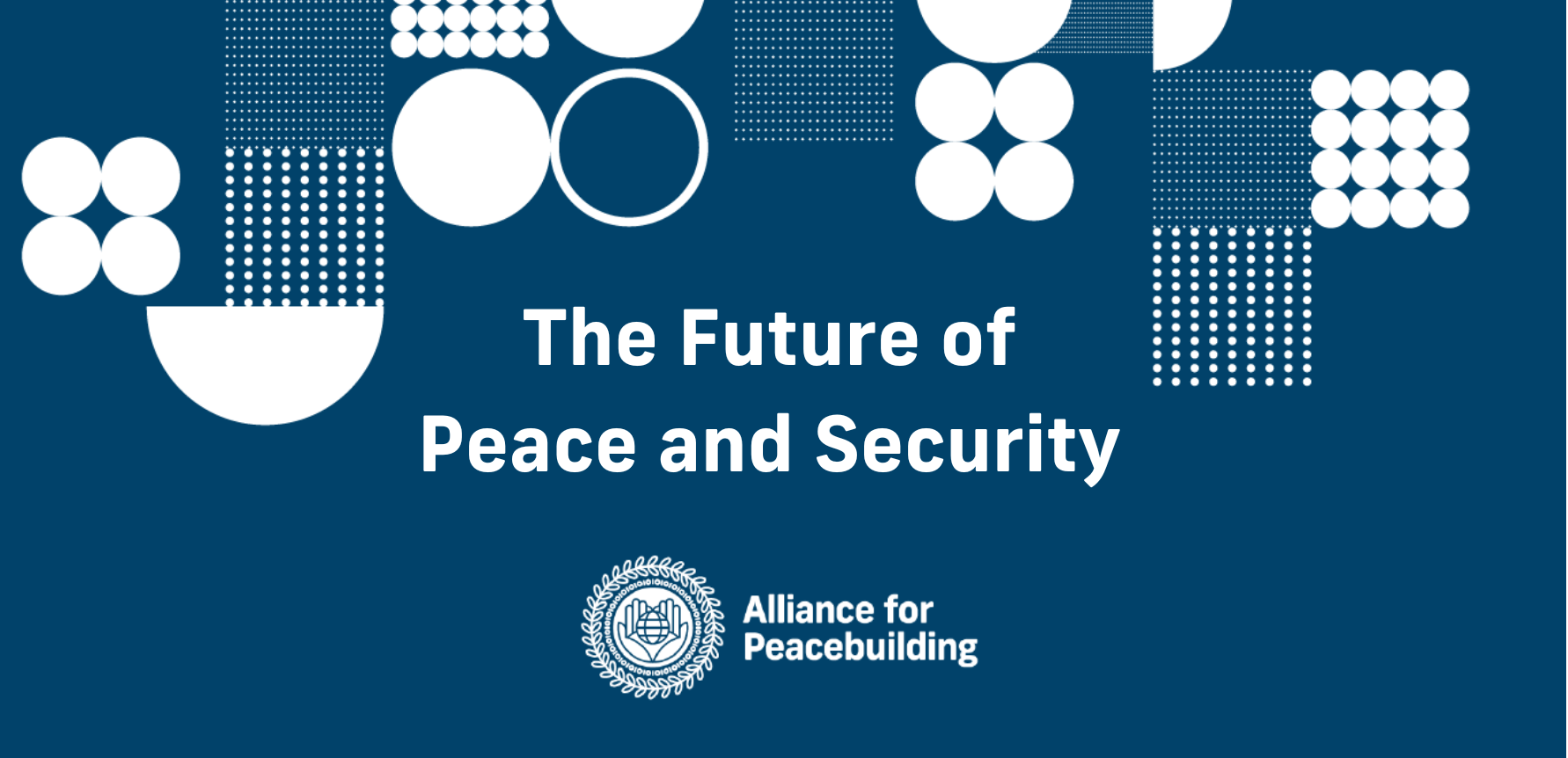The Future of Peace and Security Project
In September 2025, the Alliance for Peacebuilding launched the Future of Peace and Security Project, which seeks to help international peacebuilding organizations based in the United States and beyond come together in the face of current disruptions, determine how to adapt to shifting global dynamics, and develop a compelling vision, messages, ideas, and partnerships to win wider support for peacebuilding, conflict prevention, and inclusive human security approaches.
The Future of Peace and Security Coalition
The Future of Peace and Security Coalition, comprised of over 150 international peacebuilding experts, practitioners, and organizations is mobilizing to meet this consequential moment and shape the future. Join us!
Key Objectives
Develop an innovative vision for the future of peace and security and potential indicators of “success” for the peacebuilding field over the short, medium, and long-term.
Create a working framework for operationalizing the agreed upon vision of the future of peace and security.
Identify further research and learning necessary to adapt peacebuilding and related security laws, policies, practices, and tools to meet emerging future global trends.
Develop and amplify messaging, storytelling, and narratives that creatively make the case and build support for peacebuilding across diverse audiences.
Create new partnerships and champions of and support for peacebuilding.
Key Principles
Focus on the opportunities; embrace innovation and change. The current moment provides an opportunity to assess what was and was not working well in terms of law, policy, funding, and practice and reimagine and amplify the most effective approaches. Shaping the future will require openness to new models, partnerships, and programs. Emerging technologies could provide ways to adapt and scale peacebuilding tools to prevent and reduce violent conflict.
Be confident about what we know and have learned. Peace research and practice have made significant advancements and surfaced the key factors that lead to violence and how to foster sustainable peace and security. We have more data than ever before, driving new insights, understanding about existing and emerging challenges, and critical reflections on the past, which can allow us to build a peace and security agenda that is fit-for-purpose.
Be humble about the shortcomings and limits of efforts to date. While we have learned a lot, international peace and security efforts over recent decades have yielded mixed results, and research gaps to demonstrate impact and best practices persist. Furthermore, the field of peacebuilding is still under-recognized in broader foreign policy circles and remains siloed in law, policy, and practice from other sectors. Concurrently, public skepticism of peace and security interventions and popular support for violent approaches to societal problems is increasing.
Strive for collaboration; prioritize “big tent” approaches. Competition in the face of resource scarcity can fuel innovation, but also risks diminishing the field. The bipartisan project will seek to unify efforts, break down silos, and pursue partnerships with diverse governments, institutions, sectors, and stakeholders to maximize influence, integrate peacebuilding approaches, and shape the future.
Key Resources
Please send resources to be added to the Future of Peace and Security repository to Maria Tata.
Peter Quaranto and David Cortright. The American Peace Movement We Need Today. Waging Nonviolence, December 16, 2025
Humanity United, A Pathway to Peace: An Engagement Framework for the Next Evolution of Peacebuilding, October 25, 2025.
Seth D. Kaplan. Piecemeal Transitions in an Age of State Disintegration. Institute for Integrated Solutions, October 2025.
Dr. Comfort Ero, The Future of Peacemaking, Podcast episode, International Crisis Group, September 12, 2025.
Humanity United, Survey Brief: Global Perspectives on U.S. Funding Cuts, September 2025.
Peter Quaranto and George Lopez. Turning Trump’s Peace Overtures into Sustainable Deals. Just Security, September 2025.
Jasmine Ramsey and Summer Heidish, Minds and Movements: A Brain Science Guide to Social Change Messaging, Beyond Conflict and Humanity United, August 2025.
The Stockholm International Peace Research Institute, The Future of Conflict Resolution and Peacebuilding, July 1, 2025.
Institute for Economics and Peace, Global Peace Index 2025, June 2025.
Renad Mansour and Mark White. Why Peacebuilding Fails and What to Do About it. Chatham House, June 2025.
Belfast Center for Science and International Affairs, Harvard University, AI and the Future of Conflict Resolution: How Can Artificial Intelligence Improve Peace Negotiations?, May 2025.
Sanam Naraghi Anderlini, Isabela Karibjanian, Helena Gronberg. The Odd Couple: Women Peacebuilders and Security Actors Bridging Positions, Building Trust, International Civil Society Network (ICAN), May 2025.
Julia Cournoyer and Leena Badra. Conflict Prevention Under Pressure. Chatham House, April 2025.
Global Centre for the Responsibility to Protect and Peace Direct, When Peace Starts Local, Prevention Works: Reimagining the UN’s Approach to Atrocity Prevention and Peacebuilding, April 25, 2025.
Hannes Mueller, Christopher Rauch, et al, The Urgency of Conflict Prevention: A Macroeconomic Perspective, International Monetary Fund, March 2025.
Peter J. Hoffman, Complex Global Shocks, Emergency Platforms, and United Nations Reform, The Stimson Center, September 5, 2024.
Peter Engelke, Anca Agachi, and Imran Bayoumi. The Future of Multilateral Peacebuilding and Conflict Resolution, The Atlantic Council, November 2023.
Richard Ponzio, Nudhara Yusuf, Muznah Siddiqui, and Joris Larik, Global Governance Innovation Report 2023, The Stimson Center, 2023.
Richard Ponzio, Nudhara Yusuf, Freddie Mallinson, and Mohammed Shahrukh, Future of International Cooperation Report 2023, The Stimson Center, Doha Forum, and Global Institute for Strategic Research, Washington, 2023.
Anders Reagan, Reframing the Ontology of Peace Studies, Peace & Conflict Studies Journal, Stockholm, Sweden, 2023.
The United Nations, Future of Peacekeeping.
Center for Economic and Policy Research, Reducing Conflict and Improving Performance in the Economy (ReCIPE), funded by UK Foreign and Commonwealth Office.

